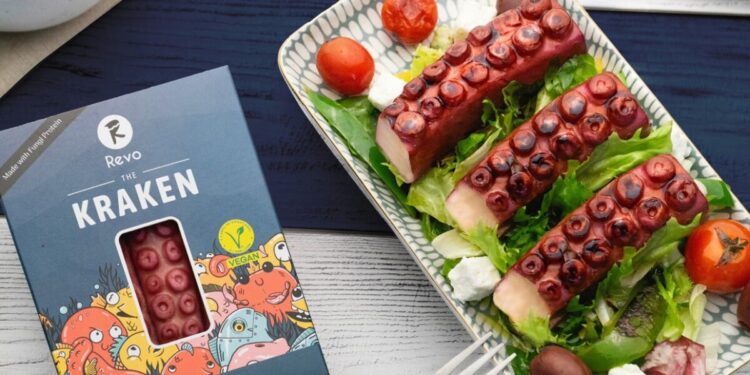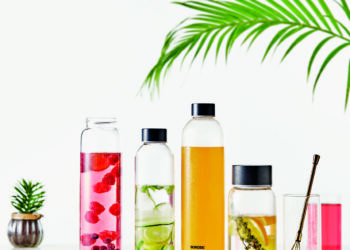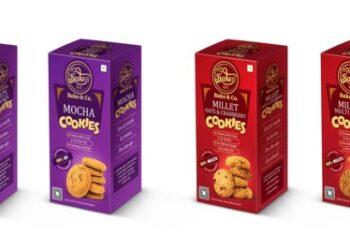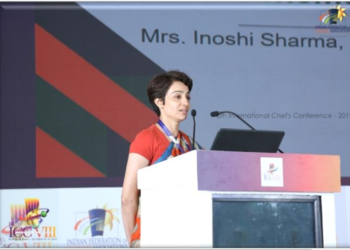Revo Foods proprietary 3D printing technology turns mushrooms into an analogue of much-loved seafood that is increasingly unethically farmed.
Six months after launching a 3D-printed salmon alternative. Austrian food technology startup Revo Foods has launched a new alternative seafood category. Its latest innovation is called The Kraken – Inspired by Octopus and is made using mycoprotein and 3D printing technology.
“With a little bit of creativity and technological know-how – and an obsession for seafood, anything is possible. If we continue like this, we can soon offer an entire plant-based seafood paella!” enthuses Robin Simsa, CEO of Revo Foods GmbH.
With the launch of their crowd funding campaign, the startup has raised €1 million of its maximum goal of €1.50 million for a limited-edition as world’s first vegan octopus. The Kraken was inspired by both the lack of available options and its “super unique” look.
Revo Foods CEO Robin Simsa shares that “While it’s probably a smaller market than salmon/tuna or other big fish species, it is nevertheless an interesting market opportunity without a lot of competition (yet),”
The consumption of octave is widespread in Italy, Spain, Japan. However, Greece, South Korea, and Turkey are all nations where the meat is considered a delicacy.It is utilized in dishes such as pollbo á feira, meze, sushi, and carpaccio, but Revo Foods claims its innovations can be used to create these dishes again, this time with a vegan approach. In addition to the ethical perspective, the range of Revo octopus has clear health benefits. Although ostriches contain selenium, they can still be poisoned by the small amount of cadmium. Certain research indicates that marine pollution can result in the accumulation of heavy metals, such as lead, in octopus tissues.
Mycoprotein-based octopus from Revo Foods avoids all these problems. It also means that people with shellfish allergies can enjoy this popular shellfish version. In addition, The Kraken has an A rating on the Nutri-Score scale and is rich in protein, omega-3 fatty acids and fiber. The Aquaculture Stewardship Council’s 2022 survey of more than 12,000 people in 12 countries found that health is the most important factor when buying seafood, and more than 80 percent agree that adding fish to everyday shopping is important for health.
CEO Robin Simsa motivation behind a plant-based octopus product, “It is a very interesting product for which no plant-based alternative exists yet [we checked and found one obscure product available which does not appear to offer realistic properties], and has a very unique texture and structure. Also, it is a speciality in many countries, but an increasing amount of people are aware of the high intelligence and social behaviour of these animals, therefore providing a suitable alternative is important.” The company is using the crowd funding campaign to increase production on its second iteration of whole salmon fillet, which will be available this fall.
“Also, we are working with several partners on customising food products according to their needs (e.g. specific shape/form that stands out), which is one of the main advantages of our 3D production technology,” said Simsa.
Vegan seafood represents a fraction (0.2%) of the total seafood market and only 1% of the plant-based meat category. Startups like New Wave Foods and Ordinary Seafood have recently gone out of business, but there have also been recent success stories, notably Revo Foods itself. Last month, it won a legal victory against the city of Vienna after a court dismissed a lawsuit accusing the company of misleading consumers with its product labeling.
The emergence of octopus farms in nations like Spain, Mexico, Chile, China, and Japan caused a lot of controversy. Spanish company Nueva Pescanova aims to build an aquaculture farm similar to industrial livestock farming, which would produce 3,000 tons of octopus per year, which is equivalent to about a million octopuses.
It has faced severe criticism from animal rights activists, academics, and climate experts. Octopus are believed to be sentient creatures and were recognized as such by the British government in a 2021 report that saw the country join Switzerland. Zealand and the United States forbid the cooking of these molluscs, a common practice in many countries and another source of control because the creatures can feel pain.Their skin is delicate and easily damaged due to the absence of an internal or external skeleton. in a farm environment, they are likely to injure handlers or engage in aggressive interactions with other octopuses. Also, there are no established commercially viable slaughter methods that utilize humane techniques.
Jennifer Jacquet, a professor of environmental science and policy at the University of Miami, added that “We’re not having the conversation of should we eat octopus or not, we’re simply at a crossroads where we can decide whether or not to put octopus into mass production. Do we need to do this? It’s really a luxury good. It’s not for survival. This is a symbol of what humans should not be doing in the 21st century.”
Environmental considerations must also be taken into account. As carnivores, they need fish or other seafood in their diet – such as fishmeal or fish oil – which are still often harvested from the ocean, and some producers are also accused of food colonialism. It takes about 3 kilograms of feed to produce one kilogram of octopus, making it a very inefficient use of resources.
Niccolo Galizzi, head of foodtech at Revo Foods, shares, “Octopus .tentacles, with their intense color and distinct suckers, are a very special product with an exciting look. So far, there has been no realistic alternative on the market. THE KRAKEN has the potential to be a real enrichment for octopus fans!” .







